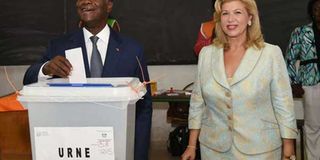African Union: Ivorian election properly run

Ivorian President Alassane Ouattara (left), flanked by his wife Dominique Ouattara, casts his ballot in Cocody, a district of Abidjan, on October 25, 2015. No major problems were reported and observers generally deemed the vote free. PHOTO | AFP | SIA KAMBOU
What you need to know:
- While first estimates from the electoral commission put turnout at “around 60 per cent”, a civil society platform placed it a touch lower, at 53 per cent.
- Observers were expecting lower participation than when Mr Ouattara won the last presidential vote in 2010, with some of the opposition calling for a boycott and three leading contenders pulling out.
- African Union observers agreed that the election was properly run.
ABIDJAN, Tuesday
Cote d’Ivoire’s weekend presidential poll won praise from observers as being peaceful and fair but saw the opposition contest turnout figures as the west African nation tries to overcome a history of electoral violence.
A reasonable turnout is crucial for incumbent President Alassane Ouattara to claim legitimacy for the vote he is tipped to win, and his administration had stressed his mandate would be contingent on a healthy rate of participation.
While first estimates from the electoral commission put turnout at “around 60 per cent”, a civil society platform placed it a touch lower, at 53 per cent.
'SORE LOSERS'
However the CNC opposition coalition, which represents two presidential candidates, put the figure at less than 20 per cent, calling the vote a “parody” and the official projection “unrealistic”.
Observers were expecting lower participation than when Mr Ouattara won the last presidential vote in 2010, with some of the opposition calling for a boycott and three leading contenders pulling out.
Ouatarra spokesman Joel N’Guessan hit back at the opposition claims, saying their behaviour was “neither dignified nor responsible” and calling them sore losers.
“There is no way that the provisional or final results... will be called into question in an irresponsible manner or above all without proof,” he added.
In 2010 turnout was sky-high, as the election had been postponed six times and the country was split in two. It was followed by months of violence in which some 3,000 people were killed.
By contrast on Sunday, though many polling stations opened late due to the delayed arrival of material and many computer tablets used to check voter IDs failed to work, no major problems were reported and observers generally deemed the vote fair.
“The election will reflect the will of the people of Cote d’Ivoire,” said former Nigerian president Olusegun Obasanjo, who headed an observer team from the Economic Community of West African States (ECOWAS).
CONCEDED DEFEAT
Kouadio Konan Bertin, one of the principal opposition candidates, conceded defeat on Monday and congratulated Ouattara on his presumed victory.
“With regard to the results in our possession, it seems clear that candidate Alassane Ouattara is on course to obtain a majority... I would like to offer him my congratulations,” he said.
African Union observers agreed that the election was properly run.
“From what we’ve seen, I believe we can, without the risk of making a mistake, conclude that it was well organised, that it was transparent,” said Aminata Toure, the former Senegalese premier who headed the AU observer mission.
The United States embassy in Abidjan issued a statement congratulating the Ivorian people on a vote that appeared to have been “peaceful, transparent, credible, and inclusive”.
“We expect the results of the first round, when announced, will be accepted by all who contested the election,” the embassy said, adding that the election was a “great achievement” for the Ivorians.
Results in the world’s top cocoa producer are expected to be announced Tuesday.
BLOODY EPILOQUE
The 2010-2011 crisis, which pitted Ouattara against former strongman Laurent Gbagbo, was the bloody epilogue to a decade of upheaval that had split the country between a rebel-held north and a loyalist south.
Violence erupted after the last vote when then president Gbagbo refused to concede defeat to Ouattara, the declared winner.
A peaceful and credible election this time round was seen as crucial to help the west African nation recover its former status as a beacon of progress and prosperity in the region.
With the country now riding high on an economic boom and growth at around nine percent, Ouattara is hoping for a first-round victory over his six challengers.
A prominent economist and former deputy head of the International Monetary Fund, 73-year-old Ouattara campaigned on having turned around the economy and assured stability after years of turmoil in the former French colony of 23 million.
Gbagbo is now in a Dutch jail awaiting trial next month for crimes against humanity at the International Criminal Court in The Hague.
Ouattara’s main challenger was former prime minister Pascal Affi N’Guessan, who ran on behalf of Gbagbo’s party, the Ivorian Popular Front.





